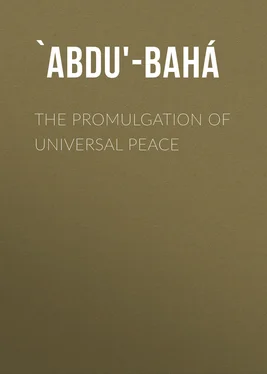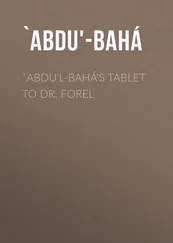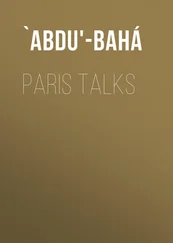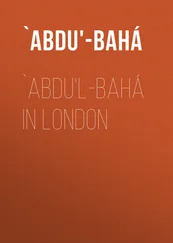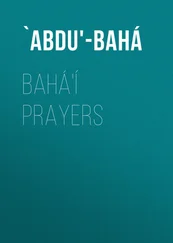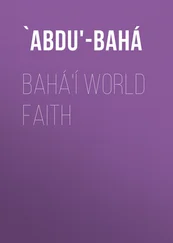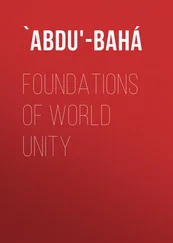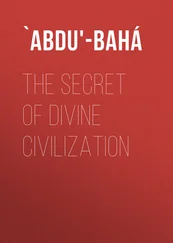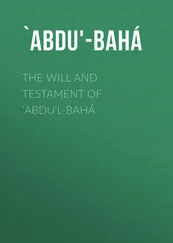`Abdu'-Bahá - The Promulgation of Universal Peace
Здесь есть возможность читать онлайн «`Abdu'-Bahá - The Promulgation of Universal Peace» — ознакомительный отрывок электронной книги совершенно бесплатно, а после прочтения отрывка купить полную версию. В некоторых случаях можно слушать аудио, скачать через торрент в формате fb2 и присутствует краткое содержание. Издательство: Иностранный паблик, Жанр: foreign_prose, foreign_religion, Философия, Ужасы и Мистика, foreign_psychology, на английском языке. Описание произведения, (предисловие) а так же отзывы посетителей доступны на портале библиотеки ЛибКат.
- Название:The Promulgation of Universal Peace
- Автор:
- Издательство:Иностранный паблик
- Жанр:
- Год:неизвестен
- ISBN:нет данных
- Рейтинг книги:4 / 5. Голосов: 1
-
Избранное:Добавить в избранное
- Отзывы:
-
Ваша оценка:
- 80
- 1
- 2
- 3
- 4
- 5
The Promulgation of Universal Peace: краткое содержание, описание и аннотация
Предлагаем к чтению аннотацию, описание, краткое содержание или предисловие (зависит от того, что написал сам автор книги «The Promulgation of Universal Peace»). Если вы не нашли необходимую информацию о книге — напишите в комментариях, мы постараемся отыскать её.
The Promulgation of Universal Peace — читать онлайн ознакомительный отрывок
Ниже представлен текст книги, разбитый по страницам. Система сохранения места последней прочитанной страницы, позволяет с удобством читать онлайн бесплатно книгу «The Promulgation of Universal Peace», без необходимости каждый раз заново искать на чём Вы остановились. Поставьте закладку, и сможете в любой момент перейти на страницу, на которой закончили чтение.
Интервал:
Закладка:
O kind Father! Confer Thy blessings. Consider not our shortcomings. Shelter us under Thy protection. Remember not our sins. Heal us with Thy mercy. We are weak; Thou art mighty. We are poor; Thou art rich. We are sick; Thou art the Physician. We are needy; Thou art most generous.
O God! Endow us with Thy providence. Thou art the Powerful. Thou art the Giver. Thou art the Beneficent.
24 April 1912
Talk at Home of Mrs. Andrew J. Dyer
1937 Thirteenth Street, NW, Washington, D.C
A meeting such as this seems like a beautiful cluster of precious jewels—pearls, rubies, diamonds, sapphires. It is a source of joy and delight. Whatever is conducive to the unity of the world of mankind is most acceptable and praiseworthy; whatever is the cause of discord and disunion is saddening and deplorable. Consider the significance of unity and harmony.
This evening I will speak to you upon the subject of existence and nonexistence, life and death. Existence is the expression and outcome of composition and combination. Nonexistence is the expression and outcome of division and disintegration. If we study the forms of existence in the material universe, we find that all created things are the result of composition. Material elements have grouped together in infinite variety and endless forms. Each organism is a compound; each object is an expression of elemental affinity. We find the complex human organism simply an aggregation of cellular structure; the tree is a composite of plant cells; the animal, a combination and grouping of cellular atoms or units, and so on. Existence or the expression of being is, therefore, composition; and nonexistence is decomposition, division, disintegration. When elements have been brought together in a certain plan of combination, the result is the human organism; when these elements separate and disperse, the outcome is death and nonexistence. Life is, therefore, the product of composition; and death signifies decomposition.
Likewise, in the world of minds and souls, fellowship, which is an expression of composition, is conducive to life, whereas discord, which is an expression of decomposition, is the equivalent of death. Without cohesion among the individual elements which compose the body politic, disintegration and decay must inevitably follow and life be extinguished. Ferocious animals have no fellowship. The vultures and tigers are solitary, whereas domestic animals live together in complete harmony. The sheep, black and white, associate without discord. Birds of various species and colors wing their flight and feed together without a trace of enmity or disagreement. Therefore, in the world of humanity it is wise and seemly that all the individual members should manifest unity and affinity. In the clustered jewels of the races may the blacks be as sapphires and rubies and the whites as diamonds and pearls. The composite beauty of humanity will be witnessed in their unity and blending. How glorious the spectacle of real unity among mankind! How conducive to peace, confidence and happiness if races and nations were united in fellowship and accord! The Prophets of God were sent into the world upon this mission of unity and agreement: that these long-separated sheep might flock together. When the sheep separate, they are exposed to danger, but in a flock and under protection of the shepherd they are safe from the attack of all ferocious enemies.
When the racial elements of the American nation unite in actual fellowship and accord, the lights of the oneness of humanity will shine, the day of eternal glory and bliss will dawn, the spirit of God encompass, and the divine favors descend. Under the leadership and training of God, the real Shepherd, all will be protected and preserved. He will lead them in green pastures of happiness and sustenance, and they will attain to the real goal of existence. This is the blessing and benefit of unity; this is the outcome of love. This is the sign of the Most Great Peace; this is the star of the oneness of the human world. Consider how blessed this condition will be. I pray for you and ask the confirmation and assistance of God in your behalf.
25 April 1912
Talk to Theosophical Society
Home of Mr. and Mrs. Arthur J. Parsons
1700 Eighteenth Street, NW, Washington, D.C
The greatest power in the realm and range of human existence is spirit—the divine breath which animates and pervades all things. It is manifested throughout creation in different degrees or kingdoms. In the vegetable kingdom it is the augmentative spirit or power of growth, the animus of life and development in plants, trees and organisms of the floral world. In this degree of its manifestation spirit is unconscious of the powers which qualify the kingdom of the animal. The distinctive virtue or plus of the animal is sense perception; it sees, hears, smells, tastes and feels but is incapable, in turn, of conscious ideation or reflection which characterizes and differentiates the human kingdom. The animal neither exercises nor apprehends this distinctive human power and gift. From the visible it cannot draw conclusions regarding the invisible, whereas the human mind from visible and known premises attains knowledge of the unknown and invisible. For instance, Christopher Columbus from information based upon known and provable facts drew conclusions which led him unerringly across the vast ocean to the unknown continent of America. Such power of accomplishment is beyond the range of animal intelligence. Therefore, this power is a distinctive attribute of the human spirit and kingdom. The animal spirit cannot penetrate and discover the mysteries of things. It is a captive of the senses. No amount of teaching, for instance, would enable it to grasp the fact that the sun is stationary, and the earth moves around it. Likewise, the human spirit has its limitations. It cannot comprehend the phenomena of the Kingdom transcending the human station, for it is a captive of powers and life forces which have their operation upon its own plane of existence, and it cannot go beyond that boundary.
There is, however, another Spirit, which may be termed the Divine, to which Jesus Christ refers when He declares that man must be born of its quickening and baptized with its living fire. Souls deprived of that Spirit are accounted as dead, though they are possessed of the human spirit. Jesus Christ has pronounced them dead inasmuch as they have no portion of the Divine Spirit. He says, “Let the dead bury their dead.” In another instance He declares, “That which is born of the flesh is flesh; and that which is born of the Spirit is spirit.” By this He means that souls, though alive in the human kingdom, are nevertheless dead if devoid of this particular spirit of divine quickening. They have not partaken of the divine life of the higher Kingdom, for the soul which partakes of the power of the Divine Spirit is, verily, living.
This quickening spirit emanates spontaneously from the Sun of Truth, from the reality of Divinity, and is not a revelation or a manifestation. It is like the rays of the sun. The rays are emanations from the sun. This does not mean that the sun has become divisible, that a part of the sun has come out into space. This plant beside me has risen from the seed; therefore, it is a manifestation and unfoldment of the seed. The seed, as you can see, has unfolded in manifestation, and the result is this plant. Every leaf of the plant is a part of the seed. But the reality of Divinity is indivisible, and each individual of humankind cannot be a part of it as is often claimed. Nay, rather, the individual realities of mankind, when spiritually born, are emanations from the reality of Divinity, just as the flame, heat and light of the sun are the effulgence of the sun and not a part of the sun itself. Therefore, a spirit has emanated from the reality of Divinity, and its effulgences have become visible in human entities or realities. This ray and this heat are permanent. There is no cessation in the effulgence. As long as the sun exists, the heat and light will exist, and inasmuch as eternality is a property of Divinity, this emanation is everlasting. There is no cessation in its outpouring. The more the world of humanity develops, the more the effulgences or emanations of Divinity will become revealed, just as the stone, when it becomes polished and pure as a mirror, will reflect in fuller degree the glory and splendor of the sun.
Читать дальшеИнтервал:
Закладка:
Похожие книги на «The Promulgation of Universal Peace»
Представляем Вашему вниманию похожие книги на «The Promulgation of Universal Peace» списком для выбора. Мы отобрали схожую по названию и смыслу литературу в надежде предоставить читателям больше вариантов отыскать новые, интересные, ещё непрочитанные произведения.
Обсуждение, отзывы о книге «The Promulgation of Universal Peace» и просто собственные мнения читателей. Оставьте ваши комментарии, напишите, что Вы думаете о произведении, его смысле или главных героях. Укажите что конкретно понравилось, а что нет, и почему Вы так считаете.
